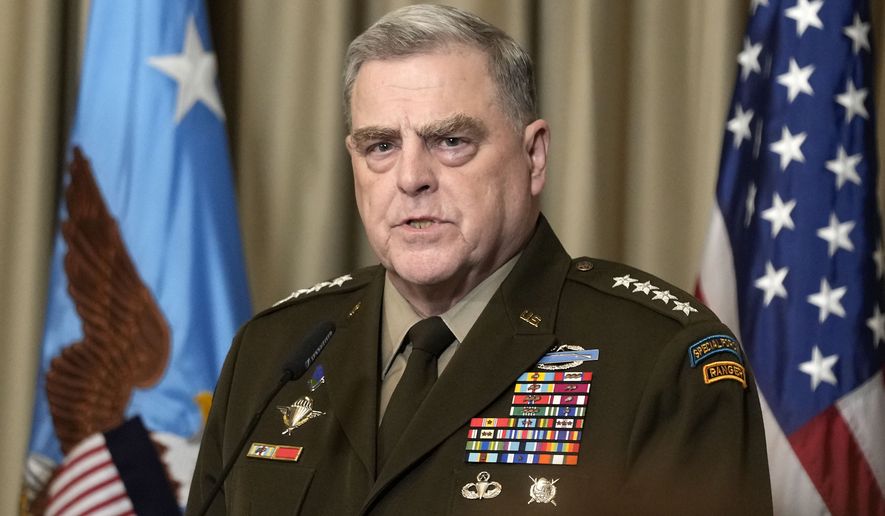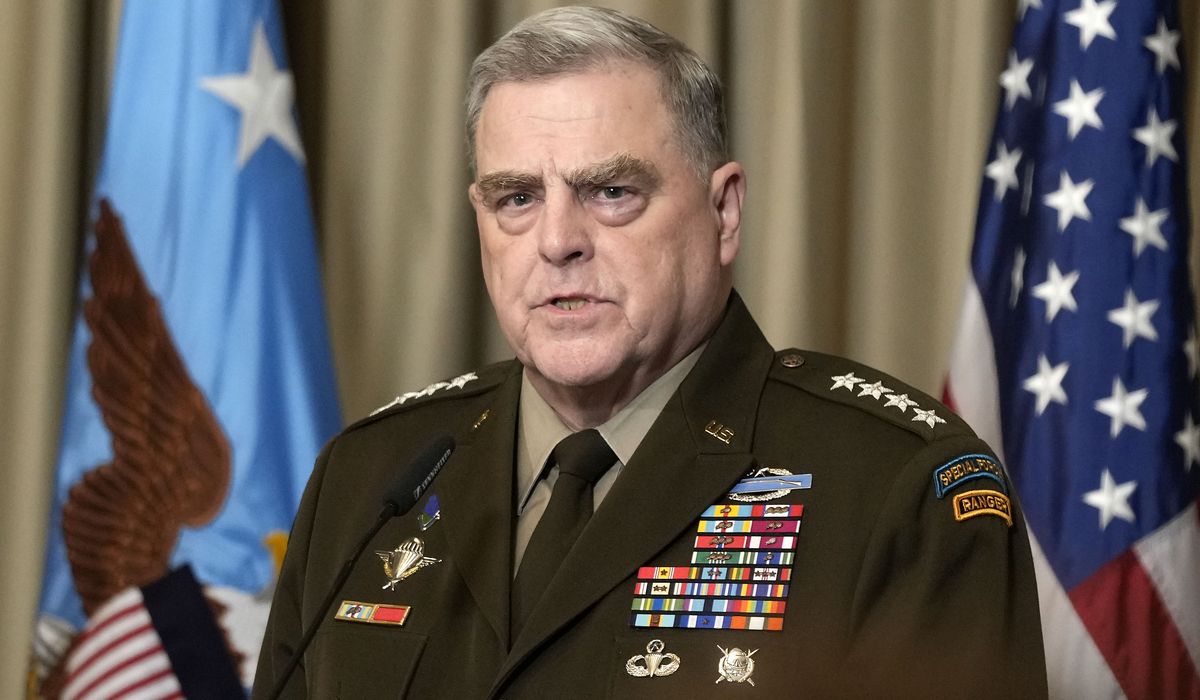beijingwalker
ELITE MEMBER

- Joined
- Nov 4, 2011
- Messages
- 65,195
- Reaction score
- -55
- Country
- Location
Chairman Milley on avoiding war with China: U.S. must strengthen military, Today we’re in a tripolar world

Photo by: Matthias Schrader
Chairman of the Joint Chiefs of Staff Mark Milley talks to the media after the meeting of the 'Ukraine Defense Contact Group' at Ramstein Air Base in Ramstein, Germany, Friday, April 21, 2023. The U.S. will begin training Ukrainian forces how to use and maintain Abrams tanks in the coming weeks, as the U.S. continues to speed up its effort to get them onto the battlefield as quickly as possible, U.S. officials said Friday. (AP Photo/Matthias Schrader)
By Bill Gertz - The Washington Times - Wednesday, May 3, 2023
Army Gen. Mark Milley, chairman of the Joint Chiefs of Staff, said the U.S. military needs to become stronger to deter a war with China, while preventing Beijing from forging a closer alliance with Russia.
Gen. Milley told the journal Foreign Affairs that unlike the Cold War standoff between the United States and the Soviet Union, military power today is divided among three nations — the United States, China and Russia.
“It is not in the U.S. interest to see Russia and China form a strategic military alliance, and we should do what we can to make sure that that doesn’t happen,” the four-star general said in a lengthy exchange with the publication. “Today we’re in a tripolar world, so three is more complicated than two — and that relationship is very difficult to manage.”
Gen. Milley said Washington must be careful not to drive China and Russia closer together in a military alliance.
“The issue is conflict and war. So, we want to make sure that Russia and China don’t form some sort of geostrategic, political, military alliance against the United States,” he said, adding there are troubling indicators that require monitoring “very, very closely.”
In February 2022, shortly before Moscow’s invasion of Ukraine, China and Russia concluded an agreement known as the “no limits” pact based on mutual opposition to U.S.-led liberal international system, according to recent congressional testimony by Adm. John Aquilino, commander of the Hawaii-based Indo-Pacific Command. And this past March, Chinese President Xi Jinping joined Russian President Vladimir Putin in Moscow and jointly called for a new world order.
“Militarily, the relationship has incrementally grown over the past decade,” Adm. Aquilino said. “In 2022, the [People’s Liberation Army] participated in Vostok 22, a multinational Russian exercise, and the two countries conducted multiple combined naval and strategic bomber patrols. Some of those highly symbolic events occurred in the air and sea spaces around Japan and near Alaska and Guam.”
Gen. Milley said lethal military support from China to Russia as it fights a war in Ukraine has been insignificant so far. Beijing military aid has been “very, very modest,” he said. The general described Mr. Xi as a “very, very tough guy, hard guy.”
While Mr. Xi and the ruling Communist Party are “very ruthless,” Gen. Milley said, “they’re very realist in the sense that they are keenly aware of cost, benefit, and risk, and they too do not want outright armed conflict with the United States.”
Gen. Milley said he believes Chinese military strategists fully appreciate the scope and depth of U.S. military might.
“Despite what people may say out there, the Chinese are fully aware of how powerful the United States is,” he said. “And so they’re not looking for that kind of armed conflict either. They want to achieve their national objectives, but they want to actually do it without armed conflict.”
The Pentagon does not yet see a cemented, long-term geopolitical alliance between China and Russia, but efforts must be made to prevent it from forming in the future, he said.
While some see parallels between Russia’s invasion of Ukraine and a potential Chinese military move against Taiwan, the U.S. commander also observed that no two wars are alike.
“An invasion of Taiwan by China is not going to look like an invasion, necessarily, of Ukraine by Russia,” he said. “The fundamentals are different, in the sense that — just the terrain and the weather, it’s obvious,” he said.
Ukraine’s land border with Russia allowed Moscow to mass up to 150,000 troops near the border and 100,000 farther back, forces that could be supplied through ground lines of communication.
“The Chinese problem is fundamentally different,” he said. “In order to attack Taiwan, they would have to mount an amphibious invasion combined with paratroopers and air assault, rotary wing helicopters, missiles, all the prep fires that would go into that; they’d have to isolate beachheads and then have to have the amphibious lift in order to do that; and cross basically a hundred miles of water, which is challenging in and of itself.”
The PLA would also have to secure underwater areas from submarine attacks, clear mines and beaches, and ultimately attack and seize urban areas in mountainous terrain that favors the defender.
“I think one lesson, though, that the Chinese are probably [aware of] is that real war is quite a bit different than war on paper,” he said. “And when real people are dying, and real tanks and infantry fighting vehicles are being blown up, and real friction is occurring, sometimes things don’t go exactly the way you may think they go.”
Chinese forces have not been observed engaging in a level of training and exercises that would indicate plans for an invasion, he added.
Taiwan’s military has some capabilities to resist a Chinese invasion, an invasion that would be further complicated by having to send forces across the 100-mile-wide Taiwan Strait using unseasoned troops and inexperienced officers, Gen. Milley said.
“I think it’s a real heavy lift, and I think the Chinese know that,” he said.
Those factors do not diminish the need for the U.S. military to maintain a strong deterrence capability to defend Taiwan.
“We know through history that the way to deter is to have a very, very strong, capable, multi-domain military, and ensure that your opponent knows that you have that capability, that that capability is overwhelming, knows that you have the will to use it, and you’ve communicated that to them,” he said.
The task is to ensure that the U.S. military becomes “not only just a little bit better, but a lot better, it’s overwhelmingly better than the Chinese military — to make sure that they know it and that we have the will to use it in the event of a crisis,” he said.
As for Taiwan, the island nation must significantly and rapidly improve its defensive capabilities and follow the Ukrainian example of producing an entire population — both military and civilian — that is prepared to fight off a Chinese attack.
Gen. Milley said the Taiwanese should adopt what has been called a “porcupine strategy,” signaling that while a Chinese attack may achieve some limited initial success, the costs would be extremely high and would vastly exceed the benefits.
“And my guess is we have a relatively limited amount of time to ensure President Xi calculates like that, and that’s what deterrence is about,” he said.
Military commanders have warned that China‘s military has been ordered to be ready for operations against Taiwan in the next four years.
The general recalled a lesson he learned as Army chief of staff several years ago while visiting Normandy, in a talk with a paratrooper from the 82nd Airborne Division who took part in the invasion during World War II.
“I said, ‘So, tell me, sergeant, what was your lesson that you want to tell the chief of staff of the Army? What’s your lesson from World War II?’
“And I thought he was going to tell me something about tactics or, you know, three second rushes, or how to shoot a weapon or whatever. And his eyes filled with tears, and he looked at me and he said, ‘General, never let it happen again. Never let it happen again.’”
Navy picks drag queen as digital ambassador
Navy veterans are reacting to reports that the service has selected a drag queen and self-described gay sailor as a “digital ambassador” for help in recruiting.
Yeoman 2nd Class Joshua Kelley, who calls himself “Harpy Daniels,” announced in November he had been picked by the Navy as part of outreach efforts to encourage more young people to enlist. In his Twitter profile, Yeoman Kelley describes himself as a “Sailor / Drag Queen / LGBTQ+ Activities / Military Queer ICON.” He stated that his new position marked a journey from performing on a Navy warship in 2018.
“Thank you to the Navy for giving me this opportunity! I don’t speak for the Navy but simply sharing my experience in the Navy! Hooyah, and let’s go Slay!” Yeoman Kelley said on Instagram.
The Navy announced in April that it is expected to fall short of its recruiting goal by around 6,000 people, the newspaper Military Times reported. Other service branches are also facing recruiting woes in what critics say is in part a response to Biden administration’s “woke” policies for the military.
Navy spokeswoman Lt. Alyson Hands said the digital ambassador program was a pilot initiative designed “to reach a wide range of potential candidates as the Navy navigates the most challenging recruiting environment it has faced since the start of the all-volunteer force.”
The pilot program, she added, “has concluded.”
“We are evaluating the program and how it will exist in the future,” the lieutenant said.
But several Navy veterans decried the selection of a drag queen as a recruiting tool. “This is a sad state of affairs for the Navy,” said a retired officer who declined to be identified by name.

Chairman Milley on avoiding war with China: U.S. must strengthen military
Army Gen. Mark Milley, chairman of the Joint Chiefs of Staff, said the U.S. military needs to become stronger to deter a war with China, while preventing Beijing from forging a closer alliance with Russia.

